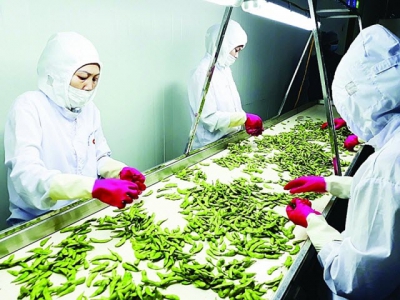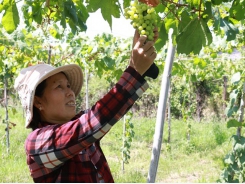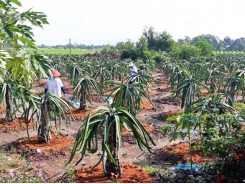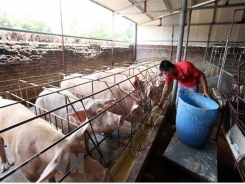Implementation of CPTPP and EVFTA: Vietnamese agricultural products overcome technical

The new generation free trade agreements (FTAs) that Vietnam has signed recently have opened up many opportunities for agricultural exports. However, in order for Vietnamese goods to dominate the global markets, they must overcome technical barriers.
Quality assurance and traceability are important factors in promoting Vietnamese agricultural exports. Photo: N. Thanh
Non-tariff barriers
Nguyen Van Linh, a farmer in Bac Ninh province, currently has 40 hectares of carrots and sugar beets for export to Japan and South Korea with a turnover of VND9 billion per year and a profit of VND3 billion per year. He said that although he is familiar with the export of agricultural products, with markets in the new generation FTAs of Vietnam such as CPTPP and EVFTA, he is still worried. “There are fruits that take 10-15 years to negotiate for export. The signing of the CPTPP and EVFTA is good, but these markets will build technical barriers, especially the quarantine of pesticide residues for export vegetables and fruits,” said Linh.
Nguyen Huu Ha (Hung Yen) currently has 12.5 hectares for growing lemons, with a total income of VND13.5 billion per year and a profit of VND5.5 billion per year. He has paid great attention to the EU market and Japan and said that these markets are fastidious in traceability of products, even requiring video clips and photos during the cultivation process. "With such strict regulations, when we sign FTAs, have we considered what lemon growers like me should do to meet those conditions?" said Ha.
Similarly, Ngo Van Dau, in An Giang province, has a farm raising 2,000 tons of pangasius annually for export with a profit of over VND1 billion per year. He said that: “Pangasius farmers were very excited when the Government signed the CPTPP and EVFTA. However, we do not understand clearly how these FTAs affect Vietnam's export agricultural products as well as farmers.”
The farmers' concerns are not unreasonable. The economist Vu Vinh Phu assessed that, although there is an opportunity due to the rapid reduction of export tariffs to countries under the signed FTAs, there are still difficulties. Vietnam's export agricultural products are challenged by stricter technical barriers of other countries. Import markets are very interested in quality standards, food safety and traceability. “They are also interested in other areas related to the production of goods such as environmental protection, social responsibility, child labor, transparency in the production in Vietnam,” said Phu.
According to Luong Hoang Thai, Director General of the Multilateral Trade Policy Department (Ministry of Industry and Trade), for goods with export benefits, Vietnam always tries the best to remove barriers when joining FTAs such as pangasius and basa catfish are products that Vietnam currently has competitive advantages. Thus, upon negotiation, authorities always require countries to open for this item. "However, it must be affirmed that, not only for pangasius and basa fish, other agricultural products, apart from the tariff barriers, there are many other barriers such as health problems, environment that importing markets pay attention to. Those requirements also need to be reconciled with export benefits," said Tha.
Chain production and quality improvement
On overcoming barriers to promote exports, Nguyen Quoc Toan, Director of the Department of Agricultural Product Processing and Market Development (MARD) said that currently, in addition to trade barriers and non-trade barriers, there are also other barriers such as dumping. Regarding trade barriers, the CPTPP and EVFTA have created very good conditions for Vietnam's tax cuts, but technical barriers are still prescribed for each commodity group and each country. Particularly for the case of vegetables and fruits, Toan said that there are three issues of concern which are requirements for plant quarantine, food safety and commodity standards. For plant quarantine, export products must have a plant quarantine certificate granted and controlled by plant protection agencies. For food safety, we are based on standards set by the International Food Safety Commission, and thereby setting our country’s own regulations. “As for the State management, we are currently working with the Ministry of Industry and Trade to disseminate periodically. Many meetings have been held for farmers and businesses, not only with the attendance of domestic experts, but also foreign experts,” said Toan.
For aquatic products, Tran Dinh Luan, General Director of the General Department of Fisheries, said that pangasius and shrimp are the two main items and will be under a lot of pressure and requirements when exporting to fastidious markets. In order for exports, these items must meet the requirements of the importing markets, in which, a very important factor for traceability is code issuance.
“The immediate thing is that farmers need to register for a code before exporting their aquatic products. In addition, each market has its own requirements, for example traceability and discharge to the environment. An issue that cannot be ignored is also a link to production. The link will create the power to help us not to be bullied,” Luan shared.
According to economist Tran Dinh Long, to deal with technical barriers, especially in the area of agricultural products, each enterprise needs to research and study standards and requirements of each market, governing law, and barriers. Enterprises need to handle these issues by applying the most advanced production technology in the world, and successfully build a quality management system according to ISO 9001: 2000, ISO 14000, HACCP. To overcome technical barriers, enterprises should note that the goods must meet quality, technical safety issues (or food hygiene) and environmental protection.
On the State's side, to support enterprises exporting agricultural products to the markets of CPTPP and EVFTA, it is necessary to continue to build a centralized material area that is large enough to supply enterprises as well as introduce a policy of investment insurance in agriculture, insurance for long-term consumption contracts, especially for export trees with relatively stable consumption markets. The authorities must quickly develop and complete a set of food safety standards, plant quarantine and enhance the ability to negotiate with export markets to have appropriate technical standards.
Vietnam is in the group of countries with the most standards and regulations (currently there are 795 standards and 97 regulations) but in fact many regulations and standards that Vietnam is applying are not appropriate; the management system is still inconsistent, resulting in asynchronous application of standards for enterprises. According to Long, the urgent thing to do is to quickly review, adjust, supplement and build new standards on quality, technique and requirements on labeling, packaging, food hygiene and safety, sanitary and phytosanitary measures in compliance with WTO requirements and international practices. "To expand the export market and overcome technical barriers, it is necessary to encourage farmers and enterprises to cooperate in chain production to effectively control the quality of agricultural products," Long said.
Có thể bạn quan tâm
Phần mềm

Phối trộn thức ăn chăn nuôi

Pha dung dịch thủy canh

Định mức cho tôm ăn

Phối trộn phân bón NPK

Xác định tỷ lệ tôm sống

Chuyển đổi đơn vị phân bón

Xác định công suất sục khí

Chuyển đổi đơn vị tôm

Tính diện tích nhà kính

Tính thể tích ao hồ




 Dak Lak needs clear direction for organic agriculture:…
Dak Lak needs clear direction for organic agriculture:…  Hai Duong seeks to promote agricultural product processing,…
Hai Duong seeks to promote agricultural product processing,…